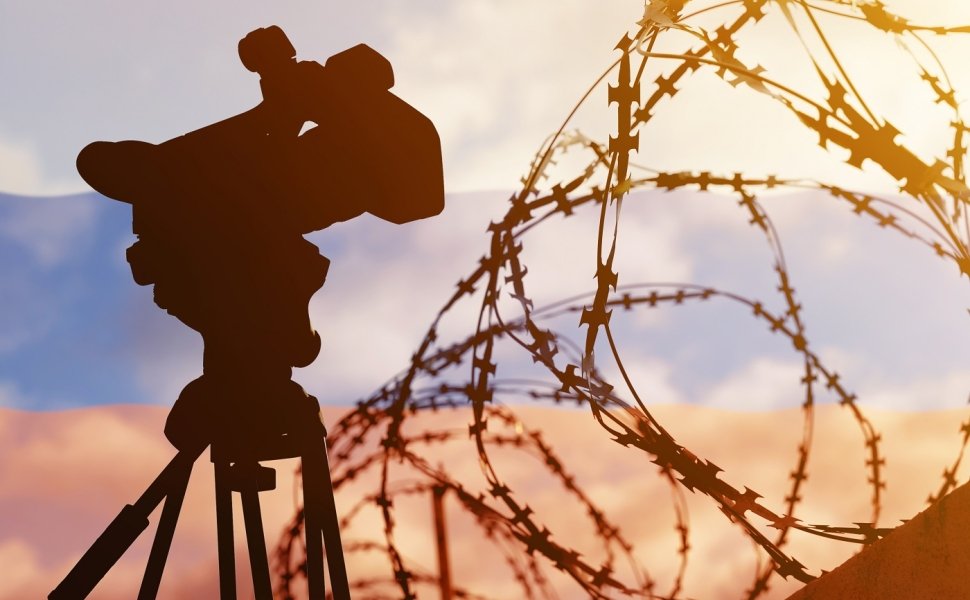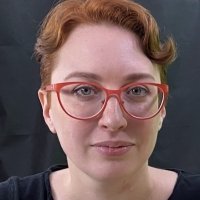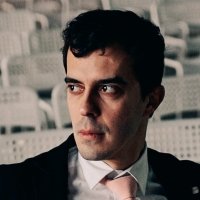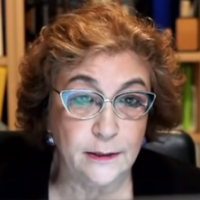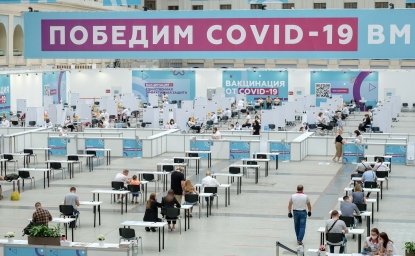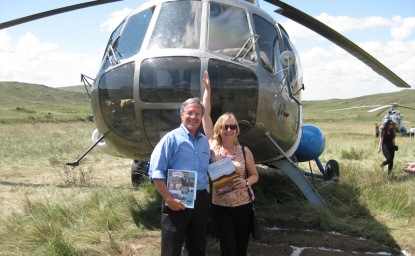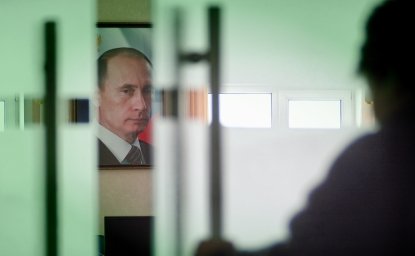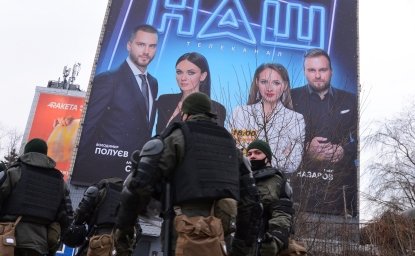This transcript has been lightly edited for clarity.
Jill Dougherty: From the Kennan Institute in Washington, D.C., welcome to KennanX, a podcast on our never-ending quest to understand Russia, Ukraine, and the surrounding region. I'm your host, Jill Dougherty.
***
Sergey Parkhomenko: These people are under colossal pressure and slowly they are being chased out of Russia. There will be fewer and fewer of them. The Russian government today is consciously engaged in destroying them. They see them as a threat to their informational monopoly. And slowly they are separating them from Russia or putting them in prison.
Jill Dougherty: That's Russian journalist Sergey Parkhomenko. The people he's referring to are his fellow Russian journalists who've left or fled Russia. Some, because of the Kremlin's repression of independent media. Others, because they oppose Vladimir Putin's war against Ukraine. Many of them now live in the Baltic countries—Latvia, Lithuania, and Estonia—and this May and June, that's where I spent several weeks, talking with them, trying to understand how they view their role as Russian journalists, now outside of Russia.
A day after I arrived in Vilnius, Lithuania, I get a text. “Jill, hi. We heard you are in Vilnius. Want to join us for our Morning Show?” The text is from friends and colleagues Tanya Felgenhauer and Sasha Plyushchev, anchors for Echo Moscow Radio. Actually, former anchors for Echo Moscow Radio. The station suddenly ceased to exist, shut down by its board of directors after Russia's censorship watchdog, Roskomnadzor, blocked its website for allegedly disseminating deliberately false information about the Russian military and for supporting extremist activity and violence.
Alexander (Sasha) Plyushchev, via translator: They closed Echo Moscow and I realized that if I was waiting for a signal, that was the signal.
Jill Dougherty: Tanya and Sasha are now working out of a makeshift studio in Vilnius, anchoring a YouTube channel. YouTube has become a kind of alternative television. Many young Russians no longer watch state TV—it's filled with propaganda and increasingly irrelevant. After our half-hour on-air discussion, I turn on my phone and interview them. Tanya tells me she hung in there in Moscow for three months after Russia invaded Ukraine.
Tatiana (Tanya) Felgenhauer, translated via Jill Dougherty: Well, at first, she says, it was adrenaline. "They’re shutting down Echo Moscow. Everybody's leaving. You have trouble understanding what's happening. And on the one hand, you have the feeling that you're being taken over by events and you want to see everything. You want to be a witness of everything. Plus, foreign journalists are constantly calling you and saying, well, how can this be?
"And you feel yourself very much needed. You’re at work all the time. And then one month goes by, and then a second month. And then you understand you have absolutely no work. You've no perspective. You do have a YouTube channel, where you continue to see things you've gotten used to saying, but every day you're reading reports that yet another journalist has been arrested or put in jail. So there's no work and there are a lot of risks. And you think, why am I staying here?"
Jill Dougherty: Tanya did think she wanted to see it to the end.
Tatiana (Tanya) Felgenhauer, translated via Jill Dougherty: But, she says, "At one moment a thought came to me that, Tanya, if they put you in jail, you won't see how this ends, because in prison they show only 'First Channel' TV, and there they won't show any of this. How will it end?"
Jill Dougherty: I ask Tanya and Sasha about the former Editor-in-Chief of Echo Moscow, Alexei Venediktov, a colleague and friend of many years. The last I'd heard, someone had left a severed pig's head at his apartment door, along with anti-Semitic graffiti.
Tatiana (Tanya) Felgenhauer, translated via Jill Dougherty: "Yes, there were several incidents," she tells me. "They threw the pig's head. Then they closed Echo Moscow. The media were liquidated. And then after a bit, they put Venediktov on the register of Foreign Agents. And that's a serious blow."
Jill Dougherty: Some of Echo's staff still in Moscow have YouTube channels, but Echo Moscow as a brand name is gone. It belongs to the owner, Gazprom Media, part of the massive state controlled energy company Gazprom.
Sasha interrupts to tell us that our Morning Show YouTube conversation drew an impressive 25,000 viewers—one reason why he thinks the Russian government keeps passing new repressive laws on the media.
Alexander (Sasha) Plyushchev, via translator: We discuss this. Why so many? I think the thing is, in Russia, there are still protests. People go out as individual protesters. They write things on social media. And perhaps the government thinks, what's feeding these protests? Who is feeding these protests? And I think they're paying attention to the journalists and activists who work abroad. And if the government is paying attention to that, it means it has influence.
Jill Dougherty: Tanya says she thinks of this time out of Moscow as a business trip–maybe a long business trip.
Do they plan on returning to Russia? Of course. They say as soon as possible. But can they go home if Putin is in power? Absolutely not, they say, “even if Putin wrote us a letter.”
Alexander (Sasha) Plyushchev and Tatiana (Tanya) Felgenhauer, translated via Jill Dougherty: Even if Putin wrote us a letter, Sasha says and Tanya adds, "We'd write a letter to him. 'Vladimir Vladimirovich, it's better if you go directly to The Hague. We’ll meet you in court.'”
***
Jill Dougherty: I'm sitting on a park bench in Riga, Latvia, with Kirill Martynov, Editor-in-Chief of Novaya Gazeta Europe.
Kirill Martynov: Yeah, Novaya Gazeta Europe is new, basically. In Russia, it was the last large independent media in the whole country. We worked there for months after the beginning of the war, and while we can’t provide journalism in Russia anymore, we just decided to do it all over again. I mean, we just … keep the team and save the team and still find some ways how we can provide information back to Russia.
Jill Dougherty: If you recognize the name Novaya Gazeta, you probably have heard of the editor in chief, Dmitry Muratov. In 2021, he was awarded the Nobel Peace Prize, along with Philippine journalist Maria Ressa. He sold the prize this June for $103.5 million, and gave the proceeds to UNICEF to help Ukrainian refugees.
In March, after the invasion of Ukraine, the Russian government sent the paper two warnings. In April, aboard a train, Muratov was splashed with caustic red paint, apparently in retaliation for his paper’s coverage of the war.
Kirill Martynov: When they sent two warnings in two days—just on Friday, then after that night on Monday–we realized that it's like, you know, a message for my fate.
Jill Dougherty: The original Novaya Gazeta and Novaya Gazeta Europe have no legal affiliation.
Kirill Martynov: So the authorities obviously know that we exist, and they already blocked us. It was a kind of honor, because we just opened our website on April [20th], and they blocked us in nine days.
Jill Dougherty: In nine days?
Kirill Martynov: Yeah, yeah. So everything’s blocked in Russia, but it was the shortest way from creating media to blocking it.
Jill Dougherty: I mean, are you still part of Russian journalism? Do people in Russia now pay attention? I know it's only three months, but yeah, you're not in Russia, you know. So do they…
Kirill Martynov: Well, you know, this situation is a kind of new, divided Europe. It forced us to create a new idea of political community because, of course, in [the] 20th century and even before, it was quite a simple situation. And if you leave [the] country, it means that you leave the community, and you don't have any connection to the country, and so on.
And in this situation, it was probably one mistake of Putin, and we have to use this mistake. In this situation, we still connected with each other, obviously, because—
Jill Dougherty: The internet.
Kirill Martynov: Yeah, because the world is still much more open than in 20th century.
Jill Dougherty: But why do you think Putin has let you go? Why do you think the journalists were allowed to go?
Kirill Martynov: It's kind of part of political theory, because if they don't have all of us in Russia, it's somehow rational for them. I mean–yeah, so we don't provide a lot of pressure inside. If you let all people who are strongly against this war, just let them go, it's just okay to be, you know, to be safe because you can provide, “yeah, everyone just supports me.”
***
Jill Dougherty: If you listened to our last podcast, you may remember Roman Doborokhotov, founder and owner of the investigative online newspaper, The Insider, who fled Moscow through a forest and is now based in Riga.
Roman Doborokhotov: So this reality now in the modern digital world, you get so much information from social networks, from different sources, that you don't usually need to witness it personally.
Jill Dougherty: In Vilnius, at another security conference, I asked colleague and friend Yevgenia Albats about that opinion. She's one of Russia's most experienced investigative journalists, chief editor of The New Times magazine, former program host on Echo Moscow and author of a seminal book on the KGB.
Yevgenia Albats: They left! That's the biggest problem, the journalists left. I can tell you that's a big problem. You no longer can post something and say—“Oy! You’re supposed to give me a comment.” You have to meet with somebody. There is no way—and I know for sure. But no one speaks on the phone anymore. Just no one. You have to meet with people in person. You go and meet with them, and they’re afraid. And they meet with you in a very constrained environment. You are not supposed to be seen with them, you know? You meet with them in parks, in the entrance buildings, in the closed clubs, so that nobody will see that you entered the same room [as a journalist].
Jill Dougherty: Yevgeniya Albats’s Foundation was one of the first to be declared a foreign agent. She's been punished with large fines. She keeps a bag packed in case she's arrested. So far, she has not been. And she hasn't fled Russia. She remains defiantly in her hometown of Moscow. Why? I ask her.
Yevgenia Albats: Because it's very easy. Because somebody has to, because it’s a shame. It's a shame. My country, Jill—I am a citizen of the Russian Federation. My country started the war of attrition, the war of choice, the war of conquest against other country.
***
Jill Dougherty: Many of the journalists I spoke with believe the war against Ukraine will have serious consequences back in Russia, even perhaps a revolution.
Tatiana (Tanya) Felgenhauer, translated via Jill Dougherty: Tanya Felgenhauer says in Russia anything is possible, but she calls talk of revolution “wishful thinking,” and she's not making any predictions.
Jill Dougherty: Sasha Plyushchev says he's watching how the economic and political elite are responding. On the one hand, he says, they're rallying around Putin. On the other hand, there's never been so much doubt. And that, he says, means there is a limit.
Alexander (Sasha) Plyushchev, via translator: This means that there's a limit, because people who are ready to put up with everything, who are satisfied with everything under Putin, have stopped putting up with it. I call that “the rocks are shaking,” so to speak. You know, when there's an earthquake, there's shaking and you know something is going to happen. Will Putin win? Will Putin lose? It's not important—there's fear. It's a feeling I experienced in 1991, 1993. It's not a logical conclusion. It's not analysis. It's pure feeling. And I think that if it continues, that shaking will turn into an earthquake.
Jill Dougherty: Yevgenia Albats says any change will not come from grassroots mobilization. It will come politically.
Yevgenia Albats: [Among] the economic elites in Moscow, I haven't met one person who supported this business. And I spoke to people at the very top, at the middle. I spoke to colonels, to people in the KGB and the FSB. I spoke to people in the MVD [Ministry of Internal Affairs]. For them, it’s a disaster. They lost millions, millions in money.
Jill Dougherty: But if so many people feel that, why aren't they doing something? I mean, everybody’s sitting there, waiting or—
Yevgenia Albats: I don’t know. It’s very well known, Jill. Books are written on that. Because those folks are going to be the first—they're going to be dead.
Jill Dougherty: So far, she says, Vladimir Putin controls the narrative in Russia. The Kremlin knows he must be perceived by Russian citizens as having won the war in Ukraine. It's not about facts. It's not about the truth, Albats says. It's about the narrative. And the key to controlling the narrative is controlling the media: exerting complete control over state media, and purging Russia of the independent media.
And that, says Sergey Parkhomenko, is a conscious government policy.
Sergey Parkhomenko: And it's not just a coincidence. It's a conscious government policy. Putin's Russia is trying to—how did they say it in Nazi Germany? To reach a final solution. They want a final solution for the independent media. They should not be in Russia—gone completely, only abroad. And then when they win the war, they’ll come for them abroad, they'll send people with Novichok to poison them.
“Well, not immediately, but later. Well, we’ll be able to do it.” They have time. That is their view of the world. That's how they think of their task, and they’re going to achieve it.
***
Jill Dougherty: KennanX is a product of the Kennan Institute at the Woodrow Wilson International Center for Scholars in Washington, D.C. It is the Wilson Center’s oldest program, founded in 1974 by George F. Kennan, American statesman, James Billington, historian and former Librarian of Congress, and historian S. Frederick Starr. Inspired by them, the Kennan Institute’s mission is to improve America’s understanding of Russia and the wider region. Thanks for listening.
